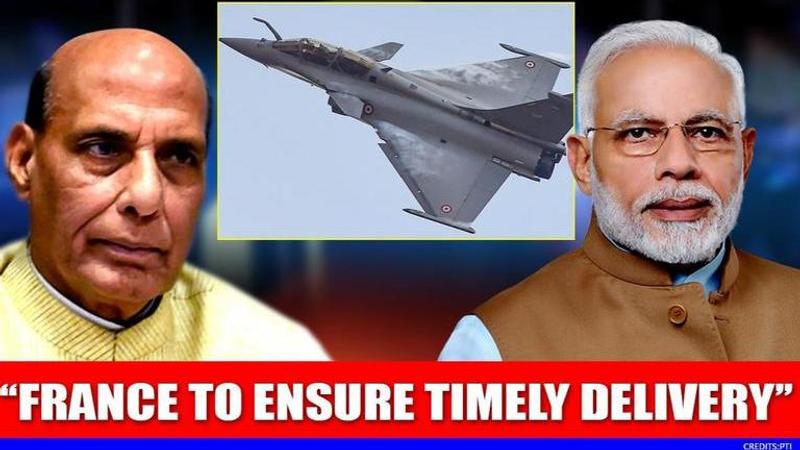Published 14:33 IST, June 2nd 2020
France will ensure timely delivery of Rafale fighter aircraft despite Covid: Rajnath Singh
Even as France is badly hit by the coronavirus pandemic, Defence Minister Rajnath Singh on Tuesday said that it will ensure timely delivery of Rafale aircrafts

Even as France is badly hit by the coronavirus pandemic, Defence Minister Rajnath Singh on Tuesday said that it will ensure timely delivery of the Rafale fighter aircraft to India. Taking to Twitter, the Defence Minister informed that he had a telephonic conversation with French Minister of Armed Forces Florence Parly. He said that while the French minister has ensured timely delivery of Rafale aircraft despite the challenges during Covid-19 pandemic, both countries have also agreed to strengthen the Bilateral Defence Cooperation between them.
"Had a telephonic conversation with French Minister of Armed Forces, Ms Florence Parly today. We discussed matters of mutual concern including COVID-19 situation, regional security and agreed to strengthen the Bilateral Defence Cooperation between India and France. We also appreciated the efforts made by Armed Forces of India and France in fighting the COVID-19 pandemic. France has affirmed its commitment to ensure timely delivery of Rafale Aircraft despite the challenges posed by the COVID-19 pandemic," Defence Minister tweeted.
READ | Coronavirus Live Updates
Earlier, French Ambassador Emmanuel Lenain had said that there will be no delay in delivery of 36 Rafale jets to India as the timeline finalised for the supply of the fighter jets will be strictly respected. "The contractual delivery schedule of the Rafale jets has been perfectly respected till now, and, in fact, a new aircraft was handed over to the Indian Air Force in end-April in France, in keeping with the contract," Lenain had told PTI.
Defence Minister Rajnath Singh received the first Rafale jet at an airbase in France on October 8, 2019. The IAF has already completed preparations, including readying required infrastructure and training of pilots, to welcome the fighter aircraft. The first squadron of the aircraft will be stationed at Ambala air force station, considered one of the most strategically located bases of the IAF. The Indo-Pak border is around 220 km from there. The second squadron of Rafale will be stationed at Hasimara base in West Bengal. The IAF spent around Rs 400 crore to develop required infrastructure like shelters, hangars and maintenance facilities at the two bases. Out of 36 Rafale jets, 30 will be fighter jets and six will be trainers. The trainer jets will be twin-seater with almost all the features of the fighter jets.
The Rafale deal
The government of India signed a deal with the French government and Dassault Aviation to procure 36 Rafale fighter jets to bolster India’s urgent requirement on the eastern and western borders in September 2016. It costs more than 7.8 billion euros. The opposition parties led by the Congress-led a frontal attack on this deal. Former Congress President Rahul Gandhi had demanded a Joint Parliamentary Committee (JPC) to probe various allegations like the escalation of procurement price and undue benefits to a private Indian company. On November 14, 2019, the Supreme Court rejected a bunch of pleas seeking a review of its December 14, 2018 judgement, which had dismissed the petitions against the Rafale deal.
Advantages of Rafale
Being a Medium Multi-Role Combat Aircraft (MMRCA), the Rafale jet is known for its speed, weapon holding capacity and attack capability. The Rafale is powered by two SNECMA M88 engines, which helps it attain a high speed of 1,912 km per hour and a range of more than 3,700 km. It also has a Martin-Baker Mark 16F ‘zero-zero’ ejection seat, capable of operating at zero speed and altitude. Equipped with the AESA radar, SPECTRA Electronic Warfare System and IRST system, Rafale is categorized as a 4.5 generation aircraft. This is invaluable as the IAF currently has only third and fourth generation fighter jets. However, its biggest advantage is its capability of delivering nuclear weapons.
Additionally, the Meteor is a game-changing missile on-board. This implies that an Indian Rafale jet will be able to shoot down an enemy aircraft over 100 km away without even crossing the air space. Weighing 1,300 kg, another key element is the Scalp long-range air-to-ground stand-off cruise missile, that can strike 600 km into the enemy territory. Some of the other India-specific modifications include radar warning receivers, low band jammers, 10-hour flight data recording, infra-red search and tracking systems.
Updated 14:33 IST, June 2nd 2020




